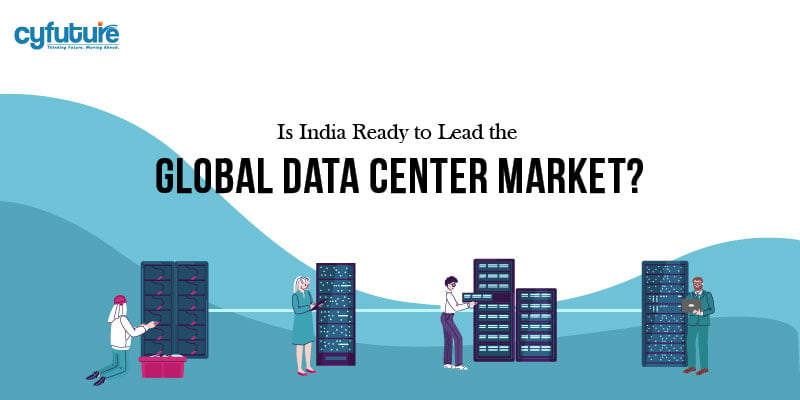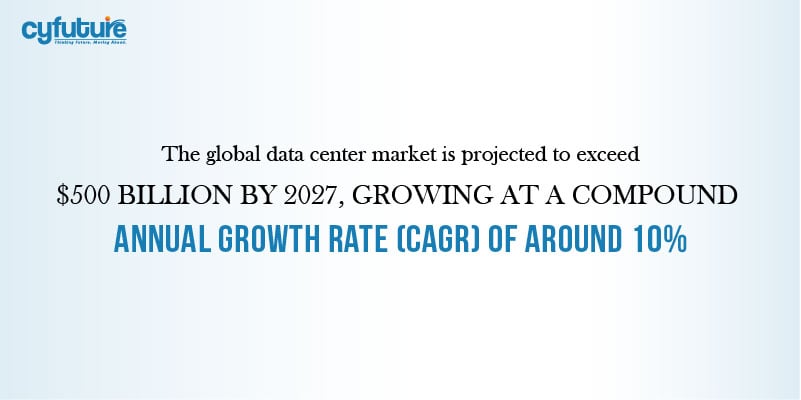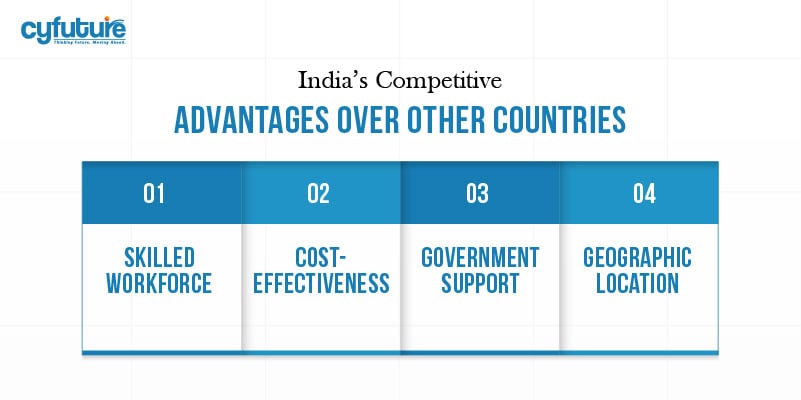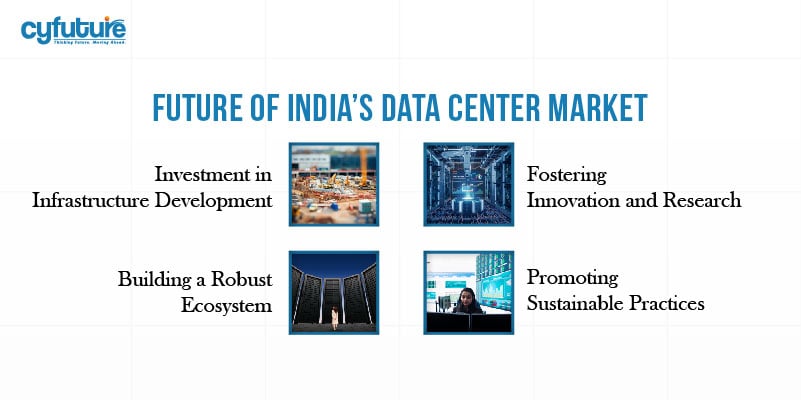-
Get Cloud GPU Server - Register Now!
Toggle navigation

The role of data centers has become increasingly significant. Furthermore, they are the backbone of our global economy. They support everything from cloud computing to e-commerce. As businesses increasingly rely on data-driven strategies, the demand for robust and efficient data centers has skyrocketed.

Moreover, it has reached a transformative phase due to digitalization, cloud computing, and the explosion of data. In such a scenario, one country stands at the forefront in terms of dominance: India.
Imagine a landscape where every click, every transaction, and every interaction finds robust infrastructure and innovative technology at the back. India, with its unique blend of technical talent, cost-effectiveness, and government support, is uniquely placed to lead the charge. But is India truly ready to take the reins of the global data center market?
In this comprehensive blog, we will examine the various aspects that contribute to India’s preparedness, such as its strategic position, technical innovations, and the rising need for data storage solutions.
Additionally, we will examine the competitive environment with a focus on important players and new developments. We’ll work together to determine if India can succeed in the global data center market.
The concept of data centers in India has seen a sea change in the last decade. Data centers were in the past mostly located at places where there was some established technological infrastructure and favorable business conditions.
However, with the emergence of cloud computing and the exponential rise in data consumption, the scenario of data centers in the world has undergone a tremendous change due to the entrance of new players.
India’s data center market currently is around $4.5 billion in size and growing at a rate of considerable magnitude in the near term. A number of drivers are helping in this growth:
The Indian economy is rapidly undergoing a digital transformation. Businesses, cutting across sectors, embrace digital technologies. The COVID-19 pandemic has accelerated the shift. Organizations have adapted to remote work, online services, and digital interaction. Thus, the need for data storage, processing, and management has also increased.
With over 700 million internet users, India happens to house one of the world’s largest online communities. Therefore, this demand for data centers is fueled because the need to store large volumes of data generated in relation to internet usage makes business activities imperative.
Cloud computing has been a game-changer for data centers. As businesses look to improve their operational efficiency and scalability, they increasingly look to cloud services, requiring a strong data center infrastructure.
E-commerce in India is growing at a pace never seen before and is expected to touch $200 billion by 2026. This, in turn, is translating into an increase in the amount of data storage and processing requirements, further strengthening the need for data centers.
With the increasing strengthening of data privacy laws in countries, companies must ensure data remains within set geographical bounds. This makes India a sought-after location for business with compliant data center solutions.
With new 5G technology coming in, faster data transfer rates and greater connectivity enhance data consumption. These would lead to greater volumes of data, for which data centers would be called upon to control these volumes.

India has several competitive advantages that make it capable of leading the global data center market. These include:
India has pools of highly skilled IT professionals, engineers, and technicians. These pools support the development and maintenance of the data centers and fuel innovation in emerging technologies. Focusing on STEM education, India is developing qualified graduates that can address issues arising in the data center space.
One of the largest advantages India has is in the cost-effectiveness. The operational cost for setting up and managing data centers in India will be much lower than it is in most of the West.
From real estate, labor costs, and energy, this will keep those costs down in terms of real estate, labor, and energy, which should be attractive to any multinational wishing to reduce its expense on data storage.
The Indian government has identified the strategic importance of data centers in the digital economy. Initiatives such as the National Policy on Data Centers and various state-level incentives are designed to foster growth in this sector.
The proactive approach of the government, coupled with investments in infrastructure, positions India as a favorable environment for data center development.
Many initiatives are in place to evolve the data center ecosystem:
It also has a strategic placement in the Asia-Pacific area that makes India more desirable. India is also a very natural hub if companies consider an expansion strategy in the Asia region.
Being situated closer to some of these emerging markets in the Southeast of Asia and the Middle East puts the data centers in this country in the best spot to be able to accommodate a far greater customer base with faster latencies and better servicing.
India has every chance of being the market leader in global data centers. However, there are certain challenges that need to be overcome for the vision to materialize.
While progress has been made, infrastructure is still one of the country’s weak points. Outages in power and connectivity as well as fewer accesses to high-speed internet restrict data centers from having any hitch while performing the services. Tier-2 and tier-3 city improvement would be very vital in terms of general infrastructures in order to be supportive for growth in the data center market.
The regulatory landscape is fairly complex for the data center operators in India. The hurdle to comply with local regulations, environmental norms, and data protection requirements would also form a restraint for enterprises wishing to establish data centers. Therefore, simplifying regulatory processes and clarity around what constitutes compliance would become paramount in order to make such investments flow in.
It also consumes much power and other resources, thus raising greater concern over the environmental implications of such an endeavor. Therefore, in a world which is now being considered more sustainable, India must definitely ensure that the strategies toward energy efficiency are well-planned and that it finds new renewable sources to power data centers so that the nation remains sustainable in terms of its reputation as a future data center hub.
In such a situation, security and privacy of the data are essential because threats and cyber-attacks related to data breach have risen in sophistication. India would require upgrading cybersecurity with well-established structures to ensure such sensitive information remains secure. Trust among businesses and consumers is going to be key in data center operations in India.

The outlook for India’s data center market is optimistic, with significant growth potential driven by various factors. To capitalize on this opportunity, stakeholders must collaborate to address challenges and implement strategies that will propel India to the forefront of the global data center market.
Enhancing the physical infrastructure that supports data centers is paramount. Investments in reliable power supply, high-speed internet connectivity, and transportation networks will facilitate the growth of data centers across the country. Additionally, developing data center clusters in strategic locations can optimize resource allocation and operational efficiency.
Encouraging innovation in data center technologies and services will be critical for India to stay competitive. Government and private sector collaboration can foster research and development initiatives aimed at creating cutting-edge solutions in cloud computing, data management, and cybersecurity.
A thriving data center market requires collaboration among various stakeholders, including government agencies, private companies, and educational institutions. Establishing partnerships between these entities can facilitate knowledge sharing, skills development, and investment in emerging technologies.
As sustainability becomes a key consideration for businesses, India must prioritize energy-efficient data center operations. Implementing green technologies, optimizing cooling systems, and exploring renewable energy sources will not only address environmental concerns but also enhance the appeal of India as a global data center hub.
Thus, India is now at the transition point regarding its bid to be at the top of the world’s data center market. Due to the growing digital economy and encouragement from the government along with its skilled workforce, it has the potential to become the dominant player in that sector. However, only through overcoming challenges from infrastructure, regulatory issues, and environmental problems can that vision come into existence.
India will, over time, evolve to be a global data center leader in collaboration with its stakeholders, dedication to innovation, and attention to sustainability. The future is bright for India’s data centers, with a steady and increasing demand for data-driven solutions, presenting India with a unique opportunity to mark its place globally.
And one thing is for sure: as India moves forward, it will become a world leader in the data center market. It would be an awesome journey to work through, and rest assured, the entire world is sitting up and taking notice.
Government policy has played a considerable role in supporting the growth of the data center industry in India. Investment in data centers has been improved by policies such as Digital India, the National Policy on Data Center Development, and many others, thereby improving infrastructure and making regulation smoother, creating a friendly environment for the operations of data centers.
Yes, a number of international technology leaders have invested heavily in India’s data center space. Google, Amazon, and Microsoft have all recently announced plans to build new data centers and expand their operations in the country, an indicator of confidence in India’s growth prospects and its strategic significance in the global market.
The growing trends in using cloud services across the globe are the major demand generators for data centers in India. In this fast-changing business world, companies increasingly are shifting to cloud-based applications that provide flexibility, scalability, and cost efficiency, and this has been accompanied by a rising requirement for strong data center infrastructure supporting such services.
Some of the future trends that shape India’s data center market are growth in cloud computing, demand for edge data centers is increasing, AI and machine learning improvements in data management, advancement in infrastructure development along with improved regulatory requirements, and focus on sustainable energy efficient data center operations.
YES. All these- investments, upgrading the infrastructure, and encouragement by the policymakers-have equipped Indian data centers as good places for providing data services. Indian data centers will be strategic centers, as they are now to access the skilled personnel of the region. Additionally, it is also offering the growth in India’s digital economy, which means the Indian data centers can show their capability as centers that service all businesses in this world.